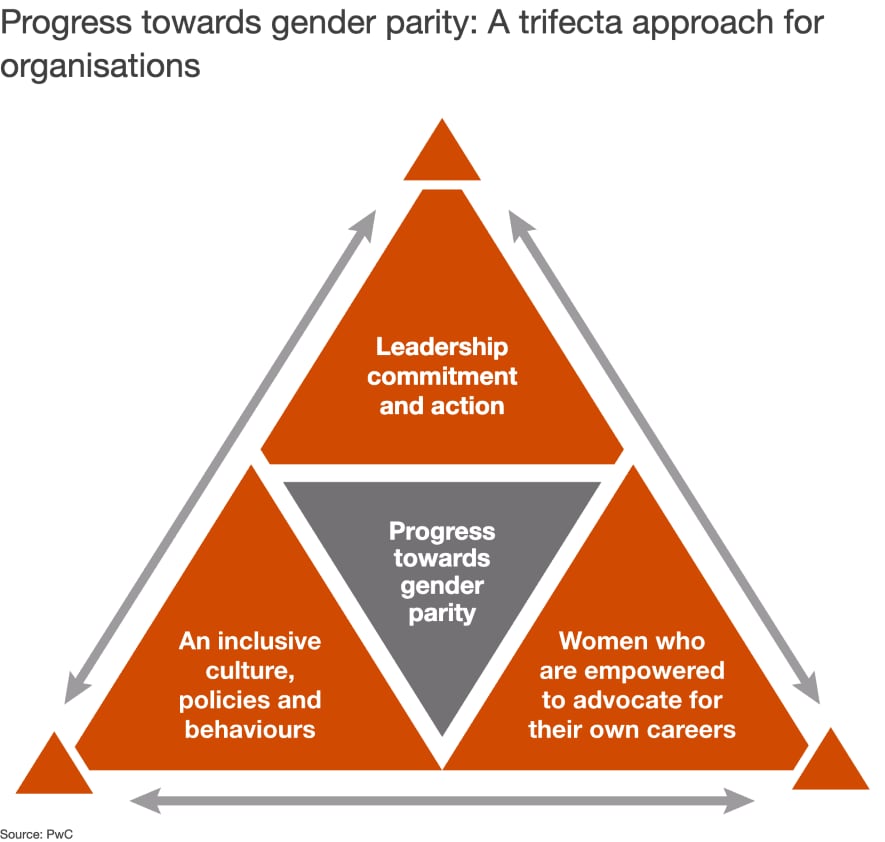
For over a century, International Women's Day (IWD) has provided an annual opportunity to showcase women's achievements and raise awareness of the need for continued action to support progress towards global gender equity. And every year, we at PwC mark the occasion with some special initiatives of our own.
This year, we highlight the global market trends of the past decade spotlighting what they continue to mean for employers and the women who work for them. We’re also sharing the results of qualitative research we’ve undertaken with over 40 of our most senior women leaders across the PwC network. And we’ve used the outputs from this research to develop a Career Advice Toolkit that provides actionable insights and guidance to support with career navigation.
Career insights from PwC's women leaders
Looking back over a decade of challenges – and progress
According to the World Economic Forum’s Global Gender Gap Report 20241 at the current rate of progress it will take about 134 years to achieve full global gender parity. That timeframe extends to an even more daunting 152 years when we zero in on the “economic” measure, which includes metrics such as labour force participation, wage equality, and the presence of women in high-skilled jobs.2
But perhaps the most shocking statistic of all is that, in the decade since 2014, the timeframe to get to global gender parity has increased by 81 years. Why the huge jump? It’s down to a range of factors – not least the fact that recent economic disruptions have had a disproportionately negative impact on women, including the COVID-19 pandemic driving what was referred to as the 'Shecession' in PwC UK’s 2021 OECD wide Women in Work report. But there are several other factors at play, too. One is persistent wage gaps and occupational segregation limiting women’s economic opportunities across the globe. Another is continued policy failings – such as insufficient policies supporting parental leave and affordable childcare – hindering women’s full participation in the workforce. A third is continued obstacles to women’s advancement within many workplaces.
Staying with the subject of advancement in the workplace, there is – fortunately – some brighter news. The past decade has seen women’s representation at CEO level of Fortune 500 companies more than double – rising from 4.6% in 2014 to 10.4% in 2024 -with 52 women now at the helm of Fortune 500 companies.3 While this marks clear progress, there’s no disputing the continued shortfall in female representation in the top jobs, given that women make up approximately 42% of the global workforce. And while progress on representation is underway, the trajectory is still too slow. Tellingly, we have yet to achieve parity at entry level – currently 48% are women – and women also remain underrepresented at every other level of the workforce, with only one in five C-suite positions held by women.4
Within organisations, despite varying levels of maturity around gender diversity, it’s an area that has truly cemented itself globally as a key focus for corporate employers over the past decade. However, in the current uncertain economic, political, and regulatory climate we’re contending with diverging approaches to advancing gender equity in workplaces across the world.
In some markets, Inclusion & Diversity (I&D) programmes are being scaled back or retrenched. In regions such as Latin America, the Middle East, and East Asia, such efforts are gaining momentum. Meanwhile, in other parts of the world, companies with established I&D programmes are proactively staying the course.5
As existing programmes become more mature, we’re seeing a trend of transitioning away from standalone I&D functions and towards embedding I&D within broader people or transformation functions, with a view to increasing the effectiveness of I&D initiatives while delivering efficiencies.6 Employers are further enhancing their I&D efforts through advances in areas such a data-based insights, technology capabilities, skills-first strategies, and broadening the gender lens to account for the impacts on women of concepts such as intersectionality. Meanwhile, there has been a growing body of research demonstrating the financial and business benefits of increased gender diversity and broader inclusion. And all of this is now happening at a time when employers in the Western World are dealing with polarising diversity policy changes.
Against this evolving background, women are continuing to enter the workforce with high career aspirations; yet systemic challenges and the impacts of gender-based bias are continuing to hamper progress, with research indicating that 9 out of 10 people – both male and female – hold fundamental biases against women.7 That said, inclusive work environments and progress on representation can play a pivotal role in tackling such biases: 70% of men and women who have worked under both female and male bosses are less likely to have a preference over a leader's gender.8 PwC research also underscores the profound impact of inclusive workplaces: women who experience high levels of workplace inclusion and empowerment are more likely to seek promotions and reskilling opportunities, voice higher job satisfaction, and recommend their employer as a good place to work.
Revisiting the macro-environment, the potential gains on offer if gender equality is achieved are significant. PwC UK’s 2025 Women in Work report estimates that improving female participation in work across the OECD has added USD$4.5 billion a year to the average OECD county’s GDP through boosted productivity since 2011. At this pace of progress, by 2030, the average OECD country will gain a further USD$15.1 billion annually.
The overall picture is clear. Today’s employers are contending with some stark realities associated with modern global gender parity efforts and shifting I&D trends, all combined with an increasingly tough macro, economic and regulatory environment. As they face up to these challenges, it’s critical that they don’t lose sight of the gains in competitive advantage that come from inclusion and diverse perspectives.
Towards Global Gender Equity, Overcoming barriers in the modern workforce
Looking across the decade of global macro and employer trends in gender diversity and inclusion, what messages can we draw for employers – and for women themselves?
Without doubt, in the face of the increasing talent challenges faced by leadership, achieving a sustainable talent pipeline is not possible without focusing on half of the global population; and harnessing the business benefits that come from increased gender diversity and inclusion. To make full use of the skills and capabilities available across all talent and at all levels, employers must adopt inclusive talent strategies that address the attraction, advancement, development and empowerment of this talent population.
At the same time, sustainable progress on gender parity across organisations will only be achieved by combining a focus on leadership representation with substantive actions to support an inclusive talent culture and talent systems from day one. This means establishing focus throughout the whole talent lifecycle. Unless they tackle the challenges that currently arise in the early stages of the talent process, organisations will continue to face the same gender gaps in the succession pipeline.
To support progress, there is a trifecta effect that needs to be in place and at play within organisations. The first element is leadership commitment and action on gender inclusivity. The second is a culture that’s focused on inclusion – one that’s underpinned by inclusive policies, practices, and behaviours, and further bolstered by a skills-first approach. The third is that women working in the organisation must be empowered to advocate for their own careers. Working together in sync, this trifecta can help to support and escalate the achievement of genuine and sustainable gains towards global gender parity.

Below you can explore what this means for employers and tap into our Career Advice Toolkit.
What this means for employers
When it comes to realising the benefits of enhancing gender inclusivity in the modern workplace, employers need to be clear and understand their macro and regulatory environment and how these feed into their own levels of inclusion maturity. Then use this baseline to ask themselves some searching questions. To help, we’ve identified 12 challenging questions that should be top of mind.
1. How well-prepared is your organisation to find, develop and retain tomorrow’s workforce – even as you deal with the talent challenges of today? And what will it cost your organisation if you get your talent pipeline wrong?
2. How will you maintain a business-led focus on I&D amid rapid megatrend fuelled rates of transformation?
3. Do you have the right talent systems and practices in place to enable women, and all talent populations to thrive?
4. How are you responding to wider I&D trends and delivering a contemporary approach to your inclusion strategy, and is your approach achieving sustainable results?
5. How are you leveraging data to understand, direct, assess and predict the direction and effectiveness of your I&D decision-making?
6. How will you harness the power of diverse talent and thinking, and leverage it to innovate?
7. Have you considered how artificial intelligence (AI) can help you gain the edge in the race for talent, and develop the capabilities your organisation needs to build competitive advantage? Are you assessing which cohorts of your workforce have access to – and capabilities in – AI?
8. Are you putting skills at the forefront of your workforce strategy, shifting your focus from pedigree to skills to maximise your talent opportunity?
9. How will you deliver equitable readiness for – and access to – opportunities for upskilling and reskilling?
10. How will you deliver an I&D strategy that is inclusive of everyone, while building inclusive behaviours with all of your people?
11. How will you deliver efforts that keep abreast of and comply with I&D regulatory requirements, but maintain strategic delivery and focus?
12. How will you foster equal inclusion across a workforce with varied working patterns and locations and transform your work-life flexibility strategies, so they are attractive and available across your entire talent pool?
What this means for women
As we highlighted above, the vital third element of the trifecta that accelerates progress towards gender parity is women being empowered to advocate for their own careers. For three successive years, PwC’s Global Workforce Hopes and Fears research has identified a consistent and highly significant gender gap around employees’ inclination to seek promotions. In the 2024 study, only 30% of women told us they were intending to ask for a promotion in the next 12 months compared to 39% of men. And only 41% of women below manager level said they feel they have opportunities to demonstrate the full breadth of their skills at work, compared to an overall figure of 74% across the genders.
The inescapable conclusion from these findings? That while talent does not discriminate, we are still faced with a situation where employers are not realising the full gains that they could from their workforce, and where women in particular are not getting to achieve their full potential. Our research also shows that, getting the environment right generates clear win-win benefits: women who experience high levels of workplace inclusion and empowerment are more likely to pursue progression, have higher future career readiness, higher job satisfaction, lower turnover intentions, and are more likely to recommend their employer as a good place to work.
Turning to what this means for women in today’s workplace, it’s important to recognise that if progress towards global gender parity is to be achieved, women also have an active role to play in driving and managing their own career development. To help with this, we’ve conducted qualitative, interview-led research with over 40 of our most senior women leaders across 30 PwC member firms. And we’ve collated and analysed their responses to create an experience-based Career Advice Toolkit that shares actionable advice and tools tailored to all stages of a career. So, whether you’re just starting out, focused on progressing your career, or making your first move into leadership, the toolkit will provide you with relevant content designed for that specific stage of your career journey.
While this toolkit is designed based on the career experiences and advice of women leaders, it has primarily been designed to include practical tips that everyone can benefit from in thinking about their career; and in better understanding gender dynamics in the workplace. And we’re making it available both within and beyond PwC, as we keep striving to deliver on our Inclusion First strategy goal of creating a positive impact on gender inclusion both within PwC and in wider society.
Wherever you may be on your career journey, let this Career Advice Toolkit help you unlock your potential, serving as a supportive companion as you focus on achieving your career goals.
Download the Career Advice Toolkit here
Sources
1. World Economic Forum Global Gender Gap Report, 2025 (https://www3.weforum.org/docs/WEF_GGGR_2024.pdf)
2. Ibid
3. Annual Fortune 500 list, 2024 (https://fortune.com/2024/06/04/fortune-500-companies-women-ceos-2024/)
4. World Economic Forum Global Gender Gap Report, 2025 (https://www3.weforum.org/docs/WEF_GGGR_2024.pdf)
5. Ibid
6. 9 Future of Work Trends for 2025, Gartner, 2025 (https://www.gartner.com/en/articles/future-of-work-trends?sf246548190=1)
7. UNDP, Gender Social Norms Index, 2023 (https://hdr.undp.org/system/files/documents/hdp-document/gsni202303.pdf)
8. IPSOS, Global Attitudes Towards Women’s Leadership, 2024 (https://www.ipsos.com/sites/default/files/ct/news/documents/2024-03/International-Womens-day-2024-report.pdf)
All accessed 6 March 2025
Women in Work Index
Explore the findings of the 13th edition of PwC's Women in Work Index
PwC’s Inclusion First strategy
At PwC, our Inclusion First strategy is for our people, our clients and our world. Learn more about our approach to Inclusion and Diversity.
Contact us



Partner, Workforce Transformation, PwC South East Asia Consulting, PwC Singapore
Tel: +65 9660 5011


















